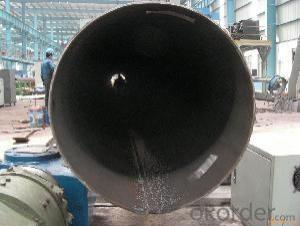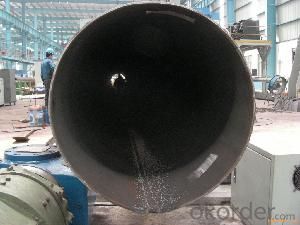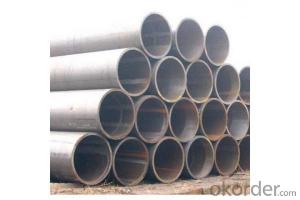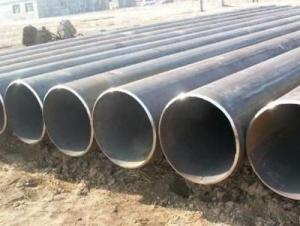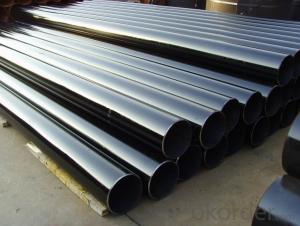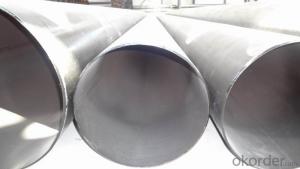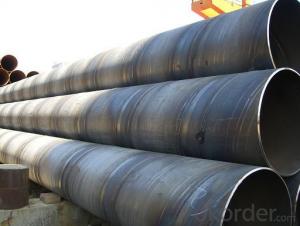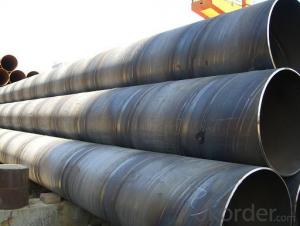LSAW STEEL PIPE 6'' -48'' CARBON API 5L
- Loading Port:
- China Main Port
- Payment Terms:
- TT OR LC
- Min Order Qty:
- -
- Supply Capability:
- -
OKorder Service Pledge
OKorder Financial Service
You Might Also Like
Packaging & Delivery
Packaging Detail: | Normal exporting packing,in container or bulk vessel or as per clients' request |
Delivery Detail: | 2 months after confimed contract |
Specifications
Large Diameter API 5L X70 PSL2 LSAW Steel Pipe
Grade: X42, X46, X50, X52, X60, B, C
OD: 1.5"-28"
WT: SCH10-SCH160
Brand:TPCO
Large Diameter API 5L X70 PSL2 LSAW Steel Pipe
Specifications:
u Standard: API 5L
u Grade: B, C, X42, X46, X50, X52, X56, X60, X65, X70, X80
u OD: 1.5"-28"
u WT: SCH10-SCH160
u Length: 5-12m
u Ends Finish: plain end, bevel end, grooved end
u Surface Treatment: bare, black varnished, oiled finish, red color, anti-corrosion, 3PE, FBE or epoxy coating
u Technique: hot rolled or cold drawn
u Application: api 5l steel pipe for conveying oil, water, gas
u Invoicing: based on theoretical weight or actual weight
u Payment Terms: L/C at sight, T/T or Western Union
u Trade Terms: FOB, CFR, CIF
u Certification: ABS manufacturing assessment, ABS design assessment, API 5CT, API 5L, DNV manufacturer certificate, ISO9001 quality management system certificate, ISO14001 environment management system certificate, GB/T28001 occupational health and safety management system certificate, A1 class manufacturing license of special equipment certificate, CCS, GL, LR, SGS, TüV, PDE
- Q: What is the purpose of a steel pipe coating?
- The purpose of a steel pipe coating is to provide a protective layer that prevents corrosion and extends the lifespan of the pipe. It also enhances the pipe's resistance to various environmental factors and improves its overall performance.
- Q: What are the advantages of using steel pipes in construction projects?
- Using steel pipes in construction projects offers numerous benefits. Firstly, the strength and durability of steel pipes are remarkable. With a high tensile strength, they can withstand heavy loads and pressures without any deformation or breakage. This makes them ideal for projects that require structural integrity, such as building construction, bridge building, and infrastructure development. Secondly, steel pipes exhibit exceptional resistance to corrosion. They are typically coated with protective layers, like galvanized zinc or epoxy, which prevent rusting and extend their lifespan. Consequently, steel pipes are suitable for both aboveground and underground applications, including water and sewage systems, oil and gas pipelines, and industrial processing plants. Furthermore, steel pipes offer great versatility in terms of shape and size. They can be manufactured in various diameters and thicknesses, allowing for customization to meet specific project requirements. This flexibility in design makes steel pipes suitable for a wide range of applications in construction, including plumbing, HVAC systems, and structural supports. Moreover, steel pipes are relatively easy to install and maintain. They can be welded, threaded, or bolted together, providing a secure and leak-proof connection. This ease of installation reduces construction time and labor costs. Additionally, steel pipes require minimal maintenance, as they are resistant to cracking, chipping, and warping. This makes them a cost-effective choice over the long term. Lastly, steel pipes are environmentally friendly. They are 100% recyclable, meaning they can be reused and repurposed without compromising their structural integrity. By recycling steel pipes, the demand for new raw materials is reduced, and waste generation is minimized. Therefore, steel pipes are a sustainable option for construction projects. In summary, the advantages of using steel pipes in construction projects encompass their strength, corrosion resistance, versatility, ease of installation and maintenance, and environmental sustainability. These attributes make steel pipes a reliable and cost-effective choice for a wide range of applications in the construction industry.
- Q: How are steel pipes used in the construction of geothermal power plants?
- Steel pipes are used in the construction of geothermal power plants for various purposes. They are primarily used to transport and circulate the geothermal fluid, which carries the heat from the underground reservoir to the surface. These pipes are typically made of high-quality steel that can withstand the high temperatures and corrosive nature of the geothermal fluid. Additionally, steel pipes are used in the construction of injection wells, where cool water or other fluids are injected back into the reservoir to maintain pressure and sustain the heat extraction process. Overall, steel pipes play a crucial role in the efficient and reliable operation of geothermal power plants.
- Q: How are steel pipes used in the manufacturing of pressure vessels?
- Steel pipes are commonly used in the manufacturing of pressure vessels as they provide the necessary strength and durability to withstand high internal pressure. These pipes are welded or seamless and are often used as the main structural component of the vessel. They allow for the efficient flow of fluids or gases within the vessel and provide a reliable and secure containment system for various industrial applications.
- Q: What is the maximum temperature and pressure that steel pipes can withstand?
- The maximum temperature and pressure that steel pipes can handle differ based on the specific grade and type of steel utilized. Nevertheless, steel pipes generally have the ability to withstand high temperatures and pressures due to their robust and long-lasting nature. In applications where high temperatures are involved, like in steam or heat transfer systems, steel pipes can typically endure temperatures up to 1000 degrees Celsius (1832 degrees Fahrenheit) or even higher. It is important to note that the exact temperature limit may fluctuate depending on the steel's alloy composition and heat treatment. In terms of pressure, steel pipes are renowned for their exceptional strength and ability to resist internal and external pressure. The maximum pressure that steel pipes can handle will depend on factors such as pipe diameter, wall thickness, and material strength. In industrial applications, steel pipes can handle pressures ranging from a few hundred psi (pounds per square inch) to several thousand psi. To ensure the safe operation of steel pipes under high temperatures and pressures, it is vital to adhere to industry standards and guidelines, as well as conduct regular inspections and maintenance. Seeking advice from engineers and professionals experienced in steel pipe systems can provide more specific information regarding the maximum temperature and pressure limits for a particular steel pipe application.
- Q: How are steel pipes used in the manufacturing of renewable energy systems?
- Steel pipes are widely used in the manufacturing of renewable energy systems due to their durability, strength, and versatility. They are commonly used in the construction of wind turbines, solar panels, and geothermal systems. Steel pipes are used as support structures for wind turbine towers, providing stability and withstanding harsh weather conditions. In solar panel systems, steel pipes are used as frames to hold the panels in place, ensuring their proper alignment and stability. Additionally, steel pipes are used in geothermal systems to transport hot water or steam from underground reservoirs to the surface for electricity generation. Overall, steel pipes play a crucial role in the manufacturing of renewable energy systems, contributing to their efficiency and longevity.
- Q: How are steel pipes used in high-rise buildings?
- Steel pipes are used in high-rise buildings for various purposes, including structural support, plumbing, and HVAC systems. They provide the necessary strength and durability to withstand the weight and forces exerted on tall buildings, while also facilitating the efficient distribution of water, gas, and air throughout the entire structure.
- Q: Can steel pipes be used for underground drainage in acidic soils?
- When considering underground drainage in acidic soils, it is important to take certain factors into account. The use of steel pipes can be suitable for this purpose, but there is a risk of corrosion over time which may weaken the pipes and potentially lead to failure. To minimize this risk, it is recommended to opt for galvanized steel pipes that have been treated with a protective coating to resist corrosion. Regular inspection and maintenance are also essential to promptly address any signs of corrosion or deterioration. Moreover, it is worth exploring alternative materials like PVC or HDPE pipes, which have greater resistance to corrosion in acidic environments. Ultimately, the choice of material should be based on a comprehensive evaluation of the soil conditions, expected lifespan of the drainage system, and budgetary constraints.
- Q: What quota is reserved for buried DN20 steel pipe?
- If it is reserved for embedded pipe pre buried steel waterproof casing, set of waterproof casing steel production and installation is to set the quota items, if the outdoor installation of welded steel pipe buried steel casing pre quota items, if it is a reserved hole, then there is no need to set the quota items.
- Q: What is lined pipe?
- There are inner pipe jacket, such as day, tube, etc.; there are outside the pipe painted, such as large-diameter water pipes. An internally coated steel pipe for corrosive medium fluids replaces the expensive stainless steel pipe.
Send your message to us
LSAW STEEL PIPE 6'' -48'' CARBON API 5L
- Loading Port:
- China Main Port
- Payment Terms:
- TT OR LC
- Min Order Qty:
- -
- Supply Capability:
- -
OKorder Service Pledge
OKorder Financial Service
Similar products
Hot products
Hot Searches
Related keywords
